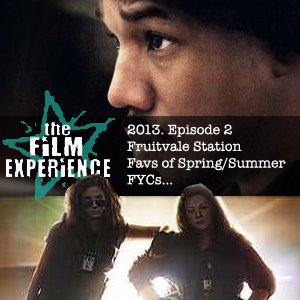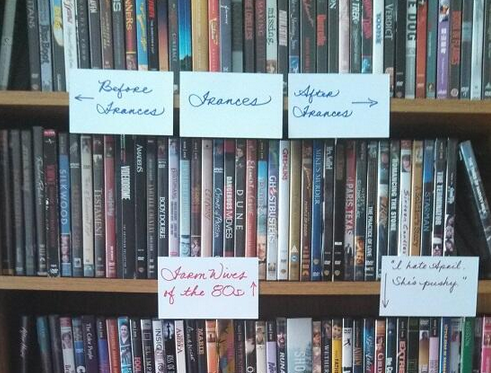Podcast: FYC Summer & Fruitvale Station
 Saturday, August 10, 2013 at 10:01PM
Saturday, August 10, 2013 at 10:01PM  Season Something. Episode 2
Season Something. Episode 2
A second consecutive week with Nathaniel, Nick, Joe and Katey ... can you believe it? (But, pssst, we recorded this one at the same time as last week's Blue Jasmine convo. As you listen Nathaniel is heading out of town for his first gay wedding, Bride & Bride division)
This week's headlining film topic is the divisive response to Fruitvale Station (previously reviewed) and whether or not it can bear the burden of its hype on "Oscar"'s march towards Oscar. We also weigh in on whether Octavia Spencer and Michael B Jordan deserve nominations for their work. But it's not all Fruitvale. We find ways to throw Short Term 12, World War Z, Blancanieves, and The Heat, into the conversation and a few old movies, text messages, and documentaries make cameos too -- you know we like to keep it loose and rangey.
P.S. Nick's DVD shelves make one more key appearance so to fully understand us you'll want to remind yourself of his chronological shelving and his idea of a Year Zero... 1982's Frances.

You can listen to the podcast here at the bottom of the post or download it on iTunes.



Reader Comments (20)
You're too good to us, Nathaniel.
Co-signing Nick's FYC for Spring Breakers. The colors! The craft!
And I am ready for Short Term 12, but I need it to play near me first!
"Hi I'm watching blue jasmine and care Blanchett has the same scarves as you." Text I sent in which misspelled Cate Blanchett. Just wanted to feel included.
Can we get one more round of applause for Dianne Wiest?
My beef with Fruitvale:
Am I the only one who thinks that the film doesn't say as much about race as its reputation would suggest? Yes, the film should be read in the context of structural racism by critically-thinking audiences, but looking at the film's plot, really one just sees the story of a guy trying to turn his life around before that life is senselessly cut short. Until the film shows protesters, nothing that I saw on screen really says, "This happened because of racial profiling." And yet, because it came out during the Trayvon Martin Affair, it's gotten this moniker of being "important" in the truths it illuminates about our society. I just don't actually think that's what the film accomplishes.
And then, even if I were to agree that film tackles racism in America, the actual Fruitvale incident is so much more complex to the point that it becomes questionable what the filmmakers cut from the film (ex: that Officer Mehserle kept his taser and gun on opposite sides of his pockets and that before shooting Oscar, he was purported to have said "Get back, I'm gonna taze him").
The film's release during the George Zimmerman trial has certainly caused the film to become as divisive, but I can't help but feel that the timing of the release has helped the film gain more of a reputation than I believe it deserves.
Anyway, great podcast as usual.
*In opposite pockets (or holsters or whatever cops keep guns and tasers in).
Sorry for the long-winded response. I was just inspired to chime in after hearing four people who, like me and unlike 90% of my movie-going friends, weren't totally enamored with the film.
Holy shit! Good podcast.
Yay!
Nick, I can't even begin to... You got me my very own "Nathaniel? It's Nicole!" moment!
The podcasts are always wonderful, but even so this one felt particularly on point. Truly illuminating discussion of Fruitvale. So happy these seem to be a weekly feature now! Also Nathaniel, there can never be too much praise for Frances Ha. Gerwig for all the awards!
@Evan It's CLEARLY obvious that Oscar and his friends were targeted and accosted because they were black. Perhaps the shooting wasn't intentionally racist, but the reason that the situation got to that point in the first place was due to racial profiling.
@Evan The Taser line came up after the fact. Videotape footage did not show him saying that. It was after the fact, that they claimed he said it.
So glad people are digging this one; I thought it was an especially fun and rewarding one to record. I just can't believe how much I monologue sometimes. Not intentional! Will patrol in future.
@Chris: I will always be ready to give more applause to Wiest. Doing it right now.
@Peggy Sue: You are welcome, girl. See you in Year Zero.
@Evan: I think I can see what you mean, and I think it's an outgrowth of that split in the movie I was talking about. Coogler hasn't figured out a way to dramatize in the first hour the ideas of inveterate, structural racism that the last half-hour treats as a given, even as it documents a totally horrifying and boldface instance of it (and structural racism seems so obvious to me in this situation and in this country that I understand taking it as a given). I agree that Fruitvale might have profited from digging further into the contested facts and reactions to the incident, but I also see why it doesn't want to grant the circumstance any he-said/he-said ambiguity. Tough line to tread. I will say, some of the actors' best work in hour one does articulate structural racism in subtle ways, like when Ahna O'Reilly just shifts her weight from one foot to the other upon meeting Oscar at the seafood counter, while pretending she isn't doing it and remaining superficially "nice." Moments like that are gold even in scenes that in other ways feel too flagged to me.
Look, I monologued again. @#$%!
Monologue away, Nick! I saw 'Fruitvale Station' yesterday, and the disjointedness of its disparate sections troubled me. It was hard to attune to what Oscar's life was, and that made it too easy for the film to be made all about his death. It's hard to know what's most important to focus on in Oscar's story, so it felt quite aimless at times.
My own pre-fall FYC campaign would probably be for Paul Rudd's performance in 'Prince Avalanche'. I know it just came out, but Rudd's performance is so sweetly sad that it kind of served as an obvious revelation of the emotional capability that was always, but often took a backseat to the comedic hijinks. In 'Prince Avalanche' they're both given equal weight, or rather simply inseparable from one another.
Nick, you are a fantastic monologuer and I'm envious of your students for being able to hear you monologue at length for hours over the educational year (not of their fees though, I'm sure) Please don't threaten to cut them short for our benefit!
Evan: aside from the answer Melissa already gave, I also question how the taser excuse would even be incorporated into a film that's pointedly trying to tell this event from Grant's perspective. It would seem really incongruous to insert that fact into the narrative Coogler decided to go with given that particular "side" of the story would have to be told from a different point of view, one outside-of and at-odds with our main protagonist. It would take away from the intended power of the film, I think. (Of course, how much that power worked is a different matter).
I'm also not sure what point the taser detail could effectively make, or how it necessarily complicates the conversation about race the film could have unless it was used to specifically point out how easily the public will latch onto the most seemingly tentative reason to exonerate white perpetrators of violence to young black men. It also doesn't seem to be a facet of the racial issues affecting black men that Coogler is exploring in this film, which seems to be more about looking at the institutionalized racism coalescing around these tragedies through a limited, personalized lens, rather than the inadequate fumbling of the judicial system and media coverage in the aftermath. Again, I'm not entirely sure if that exploration is all that successful either, but I see why that detail wasn't included and think it was fine to leave out.
Sorry for blathering on, but I have some really confusing reactions to this film and to some of the critical response to the film.
Nick - your observation about the expectations put on Fruitvale was spot on. More monologues like this please. Don't curb yourself, let it fly!
It is Christmas AGAIN?
BRB devouring this episode.
You guys NEED to do a Butler update. Or at the very least an August wrap up since I suspect much won't go down till Nov.
I disagree. Throughout the movie I kept forgetting that Oscar was going to be shot, which made the scene of his death all the devastating. It may feel disjointed because Oscar's own life is disjointed and drifting, which is sort of the point. He's not an exemplary human being by any means. He's twenty-two years old, presumably without a college education, has a criminal record, and a family to provide for. The disjointedness is the tension between his day-to-day activities and his constant ruminating on what to do with the present and future. In other words, it is a day in the life of many twenty-two-year olds in this nation, exacerbated by racial setbacks. i see no reason as to why the director would feel the need to lend more focus to his life.
caroline -- that's a good point. he's definitely in a drifting place.
@Caroline: I don't think that the complexities or paradoxes in Oscar's life need to be softened or resolved. I totally agree with you that they are the essence of his predicament, and as you say, it's not an unusual predicament. What I find unsatisfying in Fruitvale's direction is that Coogler tends to break "good moments" and "bad moments" or optimism and pessimism or upbeats and downbeats into rigidly separate scenes, or rigidly separate beats within single scenes. He evokes complexity with a series of arrows that point the audience Up and Down and Up and Down or Happy and Sad, etc., in pretty obvious and often abrupt ways. He's not as skilled yet in building contradiction and complexity into the same shot or close-up or scripted moment. I always felt aware of when he was trying to endear Oscar to his audience and when he was trying to push him away, or when he was trying to conjure hope vs. when he was trying to conjure pessimism, rather than fusing these impulses into layered, ambiguous impressions that demand deeper, subtler involvement from the audience. This isn't an unworkable style, but I think it's not the most interesting way to render complexity on screen, and since Fruitvale's problem (for me) is a general tendency to flag things too obviously, I think these kinds of distinct tonal swerves play into that, and trap the actors a little bit. But I understand that it's one way of evoking the kind of schizophrenic existence a character like Oscar is forced to navigate, and I'm glad some viewers respond more powerfully and positively to Coogler's approach than I did.